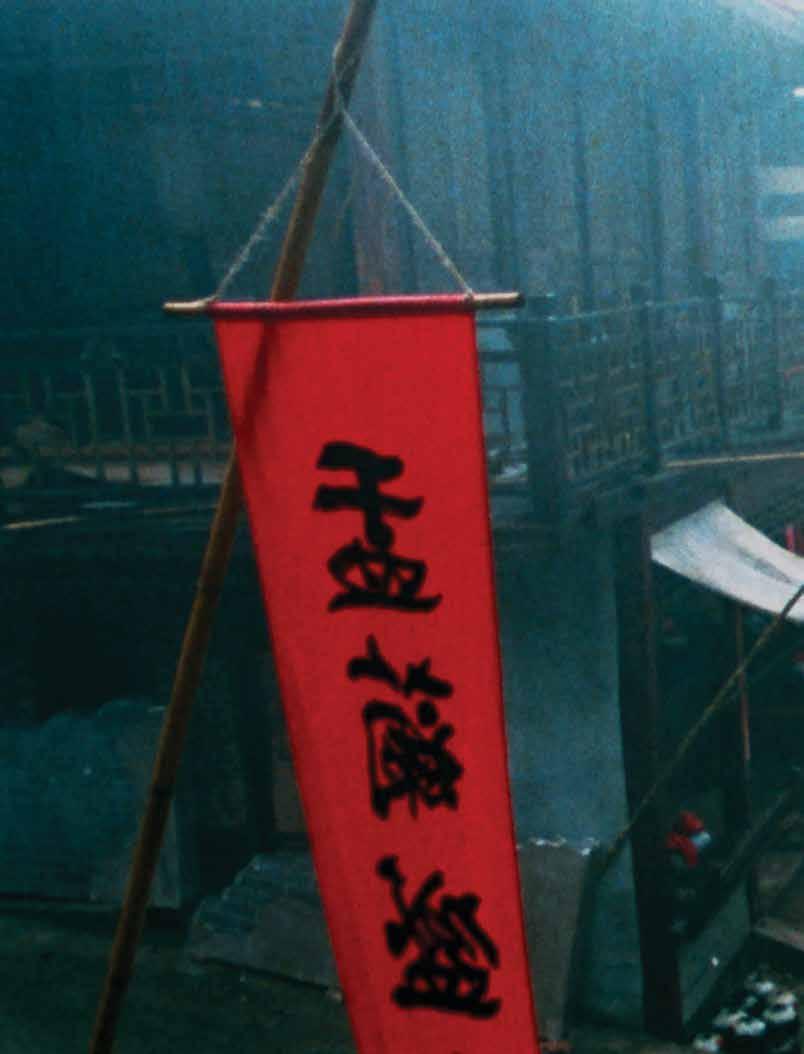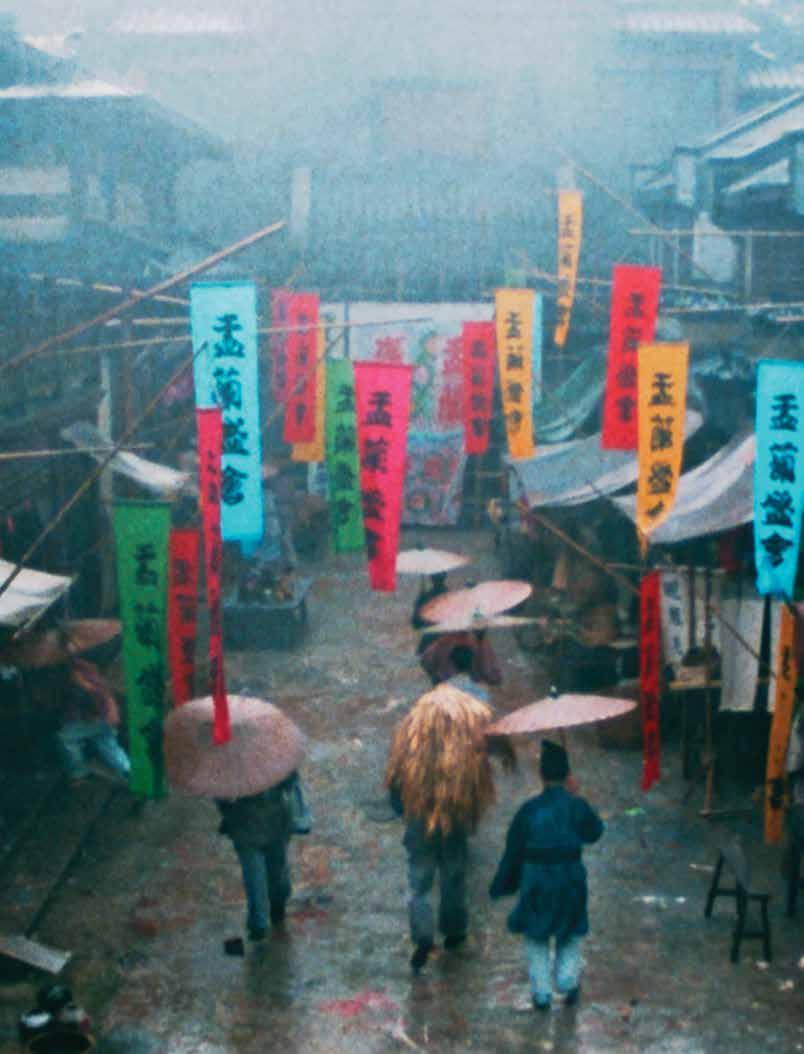

The Cinematheque
The Cinematheque, founded in 1972, is a film institute and media education centre devoted to celebrating the art and history of Canadian and international cinema and understanding the impact of moving images and screen-based media in our lives. Our public activities include a year- round calendar of curated film exhibitions devoted to important classic and contemporary films and filmmakers and an array of community outreach programs offering interactive learning opportunities in film appreciation, filmmaking, digital literacy, and critical thinking. We value cinema as a communal and transformative experience; believe in the importance of inclusivity and diversity in programming; and are committed to showcasing the finest achievements of local and national artists along with the best in world cinema.
Buying Tickets
The Cinematheque box office opens 30 minutes prior to the first screening of the day. Tickets can be purchased in advance online at thecinematheque.ca or during screening hours at our box office. By purchasing a ticket to a screening at The Cinematheque, you automatically become a member of the Pacific Cinémathèque Pacifique Society.
Support
The Cinematheque is a not-for-profit society incorporated in the province of British Columbia and a registered Canadian charity. We rely on financial support from public and private sources. Donations are gratefully accepted. A tax receipt will be issued for all donations of $60 or more. support@thecinematheque.ca
Venue Rental
The Cinematheque theatre is available for rental. We offer simple, all - inclusive rental terms and top-quality service, and are equipped for the projection of a wide range of film, video, and digital formats. Whether you are looking for somewhere to host a private screening, film premiere, community event, conference, or work function, our theatre is the ideal venue. theatre@thecinematheque.ca
Advertising
The Cinematheque offers advertising opportunities in this program guide, on-screen in our theatre, and digitally in our weekly e-blast. advertise@thecinematheque.ca
The Cinematheque’s program guide is published six times a year with a bi - monthly circulation of 12,000.
The Cinematheque gratefully acknowledges the financial support of the following agencies:
Executive Director
Kate Ladyshewsky
Artistic Director
Shaun Inouye
Learning & Outreach Director
Chelsea Birks
Communication & Marketing Manager
Gerilee McBride
Venue Operations Manager
Linton Murphy
Technical Manager & Head Projectionist
Al Reid
Operations Coordinator
Emma Pollard
Learning & Outreach Coordinators
Thea Loo, Sam Mason
Learning & Outreach Intern
David Wu
Learning & Outreach Assistant
Sangeon Yoo
Learning & Outreach Volunteer
Emma Gibb
Programming Associate
Michael Scoular
Theatre Managers
David Avelino, Prue Baker, Jessica Johnson, Luke McEwan, Asher Penn, Salem Sharp
Projectionists
Dama Correch, Ryan Ermacora, Lukas Henne, Ron Lacheur, Abigail Markowitz, Eirinn McHattie, Jana Rankov
Board of Directors
David Legault (Chair)
Leah Mallen (Vice Chair)
Rudy Bootsma (Treasurer)
Tim Reeve (Secretary)
Nicole Prior, Ken Tsui, Eric Wyness
Theatre Volunteers
Taylor Bishop, Sasha Bondartchouk, Haley Briggs, Cedric Chauve, Nadia Chiu, Curtis Comma, Inês Devezas, Robert Ferguson, Moana Fertig, Saher Ghanem, Zack Ginies, Shokei Green, Pablo Griff, Georgia Haire, Michiko Higgins, Gurjot Hothi, Fiona Hu, Chris Kay, Savannah Kemp, Ray Lai, Stewart Lampe, Simon Lee, Anna Lester, Kam Fung Li, Qun Ma, Vit Mlcoch, Milad Mokhtari, Chelsey Mulligan, Lars Neufeld, Veronika Ong, Cameron Power, Sweta Shrestha, Danika Speight, Syed Mustafa, Hava Tepperwin, Kate Tung, Wangeci Warui, Jonny Warkentin, Jonathan Wells, Marlon Wiebe, Harry Wong, Ziyi Yan, Zoé Zhang
Distribution Volunteers
Hagar Bach, Horacio Bach, Kyle Bowman, Anson Cheng, Gail Franko, Cristian Hernandez, Gerald Joe, Alan Kollins, Jim Miller, Ross Munro, Aleksander Sochan, Lora Tanaka, David Trotter, Harry Wong, Iris Xian
Office Volunteer Jo B.
Special thanks to our spare volunteers!
Program notes: Shaun Inouye, Michael Scoular
DIM Cinema notes: DIM Collective Frames of Mind notes: Selina Crammond Our Stories to Tell notes: Akira Iahtail PELAN Presents notes: PELAN
Additional program notes: Jim Sinclair
Design and layout: Gerilee McBride
Cover image: A Chinese Ghost Story, Ching Siu-tung, 1987 Contents image: 13-Hour Horror Movie Marathon
The Cinematheque is situated on the unceded, ancestral homelands of the xʷməθkʷəy əm (Musqueam), Sḵwx̱wú7mesh (Squamish), and səlilwətaɬ (Tsleil-Waututh) Nations.
Classification Information
Screenings are restricted to 18+ unless the film has been classified by Consumer Protection BC. This is indicated in our program guide and/or on our website by the inclusion of one of the following ratings:
Suitable for all ages
Parental discretion is advised
Viewers under 14 years of age must be accompanied by an adult
Viewers under 18 years of age must be accompanied by an adult
Restricted to viewers 18 years of age and over
Ticket Rates
$15 General (18+), $13 Senior (65+), $11 Student
Multi-film ticket packs are available for purchase at a discounted rate from our gift shop. Ticket rates may vary for special events. Film Club, our family matinee series, has the reduced admission rate of $7 for ages 13 and under, and $18 when combined with an adult ticket.
Free admission for First Nations, Inuit, and Métis Peoples.
Before a certain world-sweeping pandemic shuttered our cinema and made social distancing a de rigueur practice, The Cinematheque had programmed a 24 Hour Movie Marathon every other year for most of the 2010s. The last was in 2019— and we’ve fielded appeals for its return on the regular ever since! While not quite a full-scale ramp up to that daylong feat of cinephilic endurance, the marathon makes its much-awaited comeback this autumn with a bespoke, trimmed-down 13-hour Halloween edition, a graveyard shift of horror-movie binging that’ll keep the blood running cold from dusk to dawn (well, 8 pm to 9 am, anyway). Don’t sleep on securing your ticket—seating, and early-bird pricing, is limited. See pg. 16 for more details.
Shaun Inouye Artistic Director
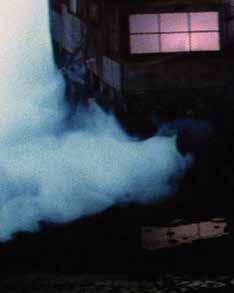
New Restorations
September 19 (Friday) 6:30 pm
September 21 (Sunday) 8:40 pm
October 1 (Wednesday) 6:30 pm
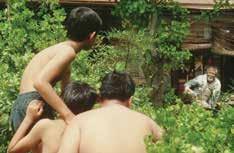
The Friends
夏の庭
Japan 1994
Somai Shinji
113 min. DCP
In Japanese with English subtitles
The awareness of Japanese director Somai Shinji outside Japan has undergone an astonishing reversal in recent years. Once a figure of mostly namedrop notability—Hamaguchi Ryusuke, Kurosawa Kiyoshi, and Kore-eda Hirokazu all regard him as an idol—the steady release of Somai’s restored films in North America has amounted to a series of jaw-slacking revelations, one (Typhoon Club) after another (Moving). That trend doesn’t falter with The Friends. Set over the dog days of a summer vacation, it chronicles—in exemplary crane-assisted, continuous-take Somai fashion—the friendship between three death-obsessed classmates and a neighbourhood recluse whose advanced years (and presumed imminent demise) first entices the boys to peer over his overgrown-garden wall. Though powered by big-heartedness and an exuberant sense of play—Somai’s child actors are, as ever, energy incarnate—The Friends doesn’t assuage the hard truths of life, not least the lessons of impermanence, that kismet that comes for all.
“Magical … Somai offers one of the most distinctive, powerful visions of recent cinema anywhere.”
David Cairns, MUBI Notebook
September 26 (Friday) 6:30 pm
September 27 (Saturday) 8:40 pm
September 28 (Sunday) 6:00 pm
October 1 (Wednesday) 8:50 pm

Linda Linda Linda
Japan 2005
Yamashita Nobuhiro 114 min. DCP
In Japanese and Korean with English subtitles
“A joyously entertaining movie.”
Tony Rayns, VIFF 2005
The infectious ’80s punk song that gives Yamashita Nobuhiro’s perfectly condensed high-school movie its title might as well be written with exclamation points after every line. But what makes this cult film so uniquely memorable is how it captures the feeling of new friendship with such understated patience—a lot can happen in three days, even if it feels like nothing dramatic is building. Yamashita doesn’t overload the premise, a “let’s form a band” mission, with backstory. There’s simmering conflict between the original members of “Paranmaum” (and consequently the need for a new lead singer) but most scenes show, without overarticulating, the key social links in the music subculture of a suburban high school. Nozomi and Kyoko convince Kei (Maeda Aki, Battle Royale) and Son (Bae Doona, The Host) to perform at an annual school festival. They practice, over and over again. Yamashita wondrously sublimates their creative energy into a patient, precisely timed narrative rhythm.
Kurosawa Akira Restored
The influence of Kurosawa Akira (1910–1998), one of cinema’s paramount figures, has remained outsized and evergreen some seventy-five years after Rashomon effectively introduced the West to Japanese film.
While various mid-century directors have watched their cachet dwindle over the decades, Kurosawa’s has held exceptionally strong, unruffled by the shifting winds of appreciation. His namemaking masterpieces of the 1950s, Seven Samurai and the aforementioned Rashomon, for instance, each fortified their standing amid the top 50 films of all time in Sight and Sound ’s latest decennial poll. Seven Samurai was anointed the greatest ever foreign-language (i.e. nonEnglish) film by balloters of a 2018 BBC poll—three other Kurosawa pictures cracked the upper 80—while Spike Lee’s 2025 transplanting of High and Low to modern-day NYC proves the storied tradition of making over Kurosawa for Western markets hasn’t lost its appeal or potential for greatness. (Among the most famous, The Magnificent Seven, A Fistful of Dollars, and, yes, Star Wars.)
Accounting for the enduring popularity of Kurosawa is a game of pie-chart percentages. How big a portion should be calculated for his unparalleled craft, his cross-cultural touchstones (Shakespeare, Dostoevsky, John Ford, Dashiell Hammet), his virtuosic reinvention of the chambara (sword fighting) genre, his legendary Mifune Toshiro collaborations—heck, the abiding high-regard for Japanese cinema, tout court?! What requires less speculation is the knowledge that, thanks to the efforts of studio Toho and distributor Janus Films, Kurosawa’s legacy is keeping pace with the times.
Following the release of a restored Seven Samurai last year (a sensation here at The Cinematheque), eight more digitally refurbished Kurosawa films are now available. Two— Stray Dog and High and Low—we cherry-picked early to coincide with our summer noir series. The six others are presented in this “Restored” program, a collection of indispensable Kurosawa classics that, with the exception of humanist drama Ikiru, all draw from the director’s iconic jidaigeki (period piece) output and feature leading man Mifune at the apex of his formidable acting prowess.
“The
term ‘giant’ is used too often to describe artists. But in the case of Kurosawa Akira, we have one of the rare instances where the term fits … His influence on filmmakers throughout the entire world is so profound as to be almost incomparable.”
Martin Scorsese
September 15 (Monday) 7:00 pm
September 21 (Sunday) 1:00 pm
September 25 (Thursday) 7:00 pm
October 13 (Monday) 3:00 pm
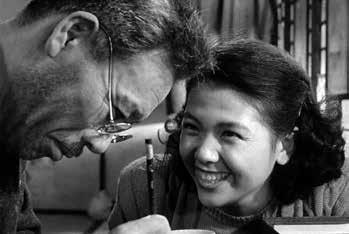
Ikiru
生きる
Japan 1952
Kurosawa Akira 143 min. DCP
In Japanese with English subtitles
Many Kurosawa admirers cite this deeply affecting piece of humanist cinema as one of the great director’s pinnacle achievements—it was among Kurosawa’s own favourites. A low-key gendai-geki (story of contemporary life) dating from the same period that produced the celebrated historical dramas Rashomon and Seven Samurai, Ikiru features Kurosawa regular Shimura Takashi as Watanabe, a hidebound minor government official. Discovering that he has but months to live, Watanabe realizes that he has accomplished nothing of significance in his time on Earth, and so sets out to do something that will give his life meaning. (“To live” is the direct translation of the title.) Kurosawa’s moving masterwork, adapted by Kazuo Ishiguro for an Oscar-nominated British remake in 2022, is both a trenchant portrait of postwar Japan and a poignant meditation on mortality. The image of Watanabe on a swing set in the snow is one of cinema’s indelible moments.
One of the Ten Greatest Films of All Time
Martin Scorsese, Sight and Sound 2022 poll
“Were it the only film Kurosawa ever made, his name would be rightfully engraved on film history.”
Nick Pinkerton, The Village Voice
September 16 (Tuesday) 9:00 pm
September 20 (Saturday) 8:45 pm
September 22 (Monday) 6:30 pm
September 26 (Friday) 9:00 pm
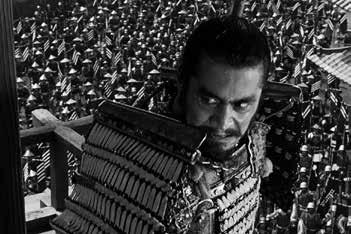
Throne of Blood
Japan 1957 Kurosawa Akira 109 min. DCP
In Japanese with English subtitles
“Unquestionably one of [Kurosawa’s] finest works—charged with energy, imagination, and, in keeping with the subject, sheer horror.”
Jonathan Rosenbaum, Chicago Reader
“After finishing Rashomon [in 1950], I wanted to do something with Shakespeare’s Macbeth,” Kurosawa said. “But just about that time the Orson Welles version was announced, so I postponed mine.” Released in 1957, Kurosawa’s rousing, ravishing take on the Bard’s great tragedy ranks as one of the director’s finest works, and one of cinema’s great Shakespeare adaptations. It was also said to be T.S. Eliot’s favourite film. Transposing the action to medieval Japan and featuring Mifune Toshiro in the Macbeth role as the samurai general Washizu, Throne of Blood combines the conventions of traditional Noh theatre with the most dynamic modern cinematic techniques, making stunning use of glorious costumes, décor, pageantry, and violence. Yamada Isuzu, as Washizu’s wife Asaji, is a memorably chilling Lady Macbeth.
October 13 (Monday) 6:00 pm
October 19 (Sunday) 8:50 pm
October 29 (Wednesday) 6:30 pm
November 2 (Sunday) 8:40 pm
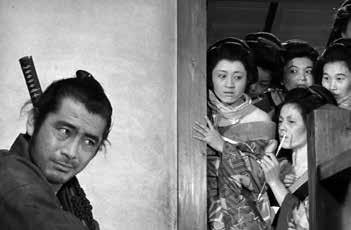
Yojimbo
Japan 1961 Kurosawa Akira 110 min. DCP
In Japanese with English subtitles
Mifune Toshiro was named Best Actor at Venice for his spirited performance in Yojimbo, a jaw-droppingly kinetic jidaigeki (period drama) that has been called “Kurosawa’s most commanding film … A visually faultless and highly sophisticated satire on violence and human weakness” (Peter John Dyer, Sight and Sound ). Mifune plays Sanjuro (literally “30-year-old man”), a scruffy, unheroic ronin who, wandering into a town divided by civil war between a silk merchant and a sake merchant, sees an opportunity to profit—by hiring himself out as a yojimbo (bodyguard) to both sides. The film is beautifully photographed in TohoScope by the great cinematographer Miyagawa Kazuo (Rashomon , Ugetsu), and abounds in brilliantly choreographed sword-swinging violence. Its box-office success in Japan led to Sanjuro, a sequel also featuring Mifune; it also serves as the blueprint for Sergio Leone’s A Fistful of Dollars .
“[An] important landmark in the director’s career—if not for its devilish hybrid of styles, inversion of genre conventions, and sly political commentary, then certainly for sheer entertainment value … A textbook example of the perfect crowd-pleaser.”
Rob Humanick, Slant Magazine
“One of the greatest directors ever to work in the cinema … Most directors have one masterpiece by which they are known. Kurosawa Akira has at least eight or nine.”
Francis Ford Coppola
October 13 (Monday) 8:20 pm
October 21 (Tuesday) 6:30 pm
October 27 (Monday) 8:50 pm
November 2 (Sunday) 6:30 pm
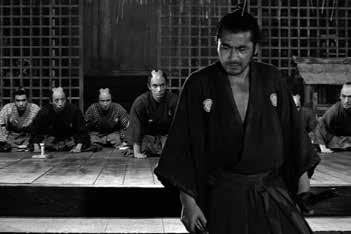
Sanjuro
椿三十郎
Japan 1962
Kurosawa Akira
95 min. DCP
In Japanese with English subtitles
“Satirical samurai action of the highest order.”
David Parkinson, Empire
Kurosawa lovingly spoofs the conventions of the samurai genre in the fast and funny Sanjuro, his made-on-the-quick (but highly regarded) sequel to the hugely popular Yojimbo. Mifune Toshiro reprises his role as the rough-edged ronin Sanjuro, here linking up with nine youthful would-be samurai as they battle corruption in their prefecture and seek to rescue a kidnapped chancellor from the clutches of an evil warlord (menacingly played by Nakadai Tatsuya). Sanjuro is full of dazzling swordplay and delicious chambara satire, and, in its famed duel-to-the-death finale, one shocking geyser of gore. For his charismatic and parodically pitched performance, Mifune was named Best Actor at Kinema Junpo’s annual awards.
October 19 (Sunday)
1:00 pm
October 24 (Friday) 6:30 pm
November 1 (Saturday) 6:30 pm
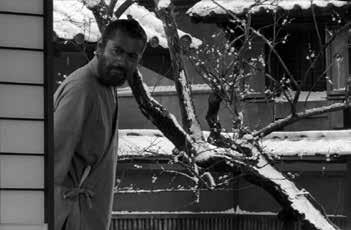
Red Beard
赤ひげ
Japan 1965
Kurosawa Akira
185 min. DCP
In Japanese with English subtitles
Considered by some to be the concluding chapter of Kurosawa’s greatest period, Red Beard is, in any event, a watershed work for the master: his last picture in blackand-white, and his final collaboration with leading man Mifune Toshiro—thus ending one of film history’s most celebrated actordirector duos. A towering humanist epic set in the early 19th century, the film has Mifune as the titular gruff but caring doctor committed to fighting poverty and illness in the slums of Edo. When intern Yasumoto (Kayama Yuzo), arrogant and puffed up with a European medical degree, is posted to his clinic, Red Beard must teach the young man a lesson or two in humility and compassion. The film is a tour de force of meticulous period design, and a virtual summation of the themes that dominate the director’s oeuvre.
Red Beard will be presented with a 10-minute intermission.
“A masterpiece … Kurosawa somehow manages to imbue every moment of this three-hour-plus movie with the transcendent vitality and intelligence of a great Victorian novel.”
Michael Sragow, The New Yorker
October 19 (Sunday) 6:00 pm
October 25 (Saturday) 8:20 pm
October 27 (Monday) 6:00 pm
October 30 (Thursday) 8:40 pm
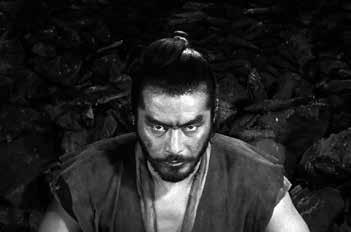
The Hidden Fortress
Japan 1958
Kurosawa Akira
139 min. DCP
In Japanese with English subtitles
“The movie that confirmed Kurosawa’s greatest strength, his innovative handling of genre … It was clearly only a small step from this to the delights of Yojimbo and Sanjuro.”
Tony Rayns, Time Out
Kurosawa was named Best Director at Berlin for this swashbuckling swords-andsamurai farce, shot on the slopes of Mount Fuji and set in 16th-century Japan. Beautifully composed in black-and-white TohoScope—Kurosawa’s first use of a widescreen format, and one of the first in Japanese cinema—the film recounts the hapless adventures of Tahei and Matashichi, two bumbling peasants tricked into accompanying a general, a princess, and a treasure of gold on a dangerous journey through enemy territory. George Lucas has cited The Hidden Fortress and Seven Samurai as chief inspirations for his Star Wars cycle, and Tahei and Matashichi are obvious prototypes for his metallic clowns R2-D2 and C-3PO. Mifune Toshiro plays the princess’s heroic protector.
Two Evenings with Ann Hui
Filmmaker Ann Hui
(b. 1947) has forged a career like no other in the history of Chineselanguage cinema.
Across four decades and 27 solo-directed feature films, she has transcended genre categories and national boundaries. After apprenticing under the legendary wuxia director King Hu and training in nonfiction at the television station TVB, Hui emerged alongside Tsui Hark and Patrick Tam as a key figure in the Hong Kong New Wave. Distinct from the approaches of those two directors, Hui fearlessly integrated currents of history, politics, and national identity in a direct way with her “Vietnam trilogy” and in her adaptations of literature, particularly works by Eileen Chang.
Hui is often identified as a humanist, perhaps because her work for the most part concentrates on contemporary life. Her films lucidly trace the partially obscured codes that shape what’s possible to be thought and acted upon in any given era—for women, activists, migrants, and heroes. She is also a distinctly postwar artist. Her master’s thesis was on the nouveau roman iconoclast Alain RobbeGrillet, and Hui’s boldest moves as a filmmaker can be seen in the films where she freely charts cinematic modes of time and space in the modernist tradition. A great deal of her work concerns the impossibility of returning home again, a paradox that she knows is politically and materially concrete, but also belongs to the terrain of memory and imagination.
The Cinematheque, the Chinese Canadian Museum, and the SFU Department of World Languages and Literatures, with support from the UBC Hong Kong Studies Initiative and the Asian Independent Cinema Showcase, are proud to welcome Ann Hui for a special two-night engagement in which she will present a pair of her key masterworks. The award-winning director will introduce her recently restored Boat People, and discuss her career in the context of Song of the Exile
Acknowledgements: The Cinematheque is grateful to Melissa Karmen Lee and Yilin Chen, Chinese Canadian Museum, Jia Fei, SFU Department of World Languages and Literatures, and Helena Wu, UBC Hong Kong Studies Initiative and AICS, for their invaluable assistance in organizing this program.
September 16 (Tuesday) 6:30 pm

Boat People
投奔怒海
Hong Kong 1982
Ann Hui
109 min. DCP
In Cantonese, Vietnamese, and Japanese with English subtitles
The culmination of Ann Hui’s “Vietnam trilogy” follows photojournalist Akutagawa (George Lam), whose skepticism in postwar Danang guides him away from an official city tour to the less easily framed actions of locals—those clinging to life or about to escape for new ones. Boat People was controversial on its release: the film was initiated by left-wing producer Miranda Yang, but criticized at Cannes for not being supportive of the new Socialist Republic. It was then banned in China for not being critical of Vietnam, and in Taiwan for having been shot in mainland China. Hui’s ultimate and profoundly committed concern in the film, seen via Akutagawa’s encounters with official, reactionary, and secluded versions of events, isn’t only a political stance but a modernist inclination. What, the film asks, are the powers and the limitations of the camera? The chronicler behind the lens is both Akutagawa and Hui. The film’s original-language title is the more suggestive “Into the Raging Sea.”
Introduced by director Ann Hui.
Best Film, Director, Screenplay, New Performer, Art Direction
Hong Kong Film Awards 1983
“Masterful … Unquestionably one of the most important films in Hong Kong cinema.”
Edmund Lee, Time Out
Co-presented with


September 18 (Thursday) 7:00 pm

Song of the Exile
客途秋恨
Hong Kong/Taiwan 1990
Ann Hui
100 min. DCP
In Cantonese, Japanese, Mandarin, and English with English subtitles
“Uncanny … Song of the Exile is striking in the way it parcels out knowledge of a mother’s history as a gradual, lived revelation—at first too close to see, but clearer with the passing years.”
Phoebe Chen, Film Comment
Ann Hui’s most autobiographical film is also her most formally refined, an emotionally layered portrait of familial conflict that counts as the closest connection between the Hong Kong and Taiwanese New Waves. Hueyin (Maggie Cheung) is finishing her master’s degree in London. Surrounded by friends, she’s abruptly invited to Hong Kong for her sister’s wedding, a return that’s both more vivid and more alienating than her adopted English home. Hui, working with screenwriter Wu Nien-jen (who penned Edward Yang’s That Day, on the Beach and Hou Hsiao-hsien’s Dust in the Wind ), constructs an elaborate framework where the past, both as it’s understood by Hueyin and complicated by her mother’s side of the story, almost takes on a will of its own in guiding the film. Hueyin’s odyssey is away from what she knows (from London to Hong Kong to southern Japan) and increasingly closer to her mother’s experience, a specific form of tension that both deepens sympathy and reopens wounds.
Followed by a conversation with director Ann Hui, moderated by Helena Wu.
Supported by


Once Upon a Time in Hong Kong
The popular cinema of Hong Kong has defied limits with cool confidence for generations, but never more than in the period of the New Wave to the Handover (1979–1997).
“For about twenty years, this city-state of around six million people had one of the most robust cinema industries in the world,” wrote David Bordwell in Planet Hong Kong. This was a “pure cinema” founded on the rich artistic roots of Cantonese opera, martial arts, popular music, and the first century of cinema (influences from silent-era melodrama, American Westerns, and the formal precision of Jean-Pierre Melville are all buried in these genre works). It all took place in an industry where anything might be made so long as the material could explode—in the form of onscreen pyrotechnics or contagious laughter—for a paying audience. The two forces of art and commerce, for a brief, ephemeral studio age, danced in near-perfect harmony.
A popular cinema fades when it no longer commands a mass audience, and North American theatrical channels for Hong Kong movies, subject to the whims of temporary distribution deals, dried up around the time analogue distribution transitioned to digital, further complicating matters. But a significant change was augured at the start of 2025: the catalogue of Golden Princess, one of the key production houses of the era alongside Shaw Brothers and Golden Harvest, is now, suddenly, available in its entirety, with restoration work well underway. The Cinematheque, via Shout! Studios and GKIDS, is proud to reintroduce some of the most iconic figures of Hong Kong cinema, including John Woo, Ringo Lam, and, as an addendum to our summer retrospective, Tsui Hark. More titles in this series will be presented in future programming cycles.
Begins September 19
September 19 (Friday) 8:50 pm
September 21 (Sunday) 6:00 pm
September 22 (Monday) 8:50 pm
September 27 (Saturday) 6:00 pm
September 28 (Sunday) 8:30 pm
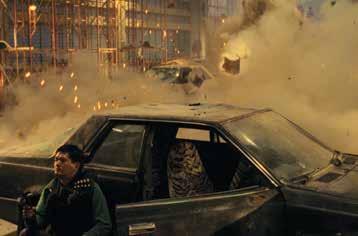
Hard Boiled 辣手神探
Hong Kong 1992
John Woo
128 min. DCP
In Cantonese with English subtitles
New Restoration
The art of the action sequence arguably reached its zenith in John Woo’s unapologetically in-your-face heroic bloodshed epic, an exclamation point on the balletic gunplay genre he helped define and deliver to the mainstream. A tough-guy bromance flanked by extreme violence and everything-explodes logic, Hard Boiled sets down amid a brutal Hong Kong crime wave where Triad arms dealers and HK police are engaged in a tug of war for control of the city. When supercop “Tequila” Yuen (Chow Yun-fat) loses his partner in a firefight, his warpath to vengeance brings him barrel-to-barrel with Alan (Tony Leung Chiu-wai), a gangster whose loyalties are not above suspicion. Woo, in service to action spectacle above all else, choreographs shoot-outs, spring-loaded bodies, combustible vehicles, and truly incredible stunts and pyrotechnics with an adrenaline-crazed genius unmatched in the Hollywood career that followed. This glistening new restoration debuted at Cannes Classic 2025.
“An explosively visceral, operatic tour de force … Action cinema doesn’t come any better than this.”
Mark Salisbury, Empire Magazine
“Hong Kong films can be sentimental, joyous, rip-roaring, silly, bloody, and bizarre … These outrageous entertainments harbour remarkable inventiveness and careful craftsmanship … The best of them are not only crowdpleasing but also richly and delightfully artful.”
David Bordwell, Planet Hong Kong
October 18 (Saturday) 9:00 pm
October 21 (Tuesday) 8:40 pm
October 26 (Sunday) 4:00 pm
October 30 (Thursday) 6:30 pm
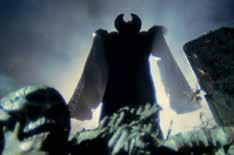
A Chinese Ghost Story
倩女幽魂
Hong Kong 1987
Ching Siu-tung
96 min. DCP
In Cantonese with English subtitles
New Restoration
“A Chinese Ghost Story is a seminal text, for it brings to an apex everything Hong Kong cinema is good at, [taking] ideas and techniques from everywhere.”
Berenice Reynaud, Film Comment
After Tsui Hark met action coordinator
Ching Siu-tung while working on Peking Opera Blues, the two teamed up to make one of the great B-movie series during the height of Hong Kong action cinema. A gothic romance, a folk horror story, and a showcase for gravity-defying wirework, A Chinese Ghost Story centres on the relationship between hapless tax collector Choi-san (Leslie Cheung) and an ethereal ghost (Joey Wong); the lovers are chased by stop-motion undead, tree demons, and the rapid pursuit of POV camera acrobatics. Tsui and Ching were working from reliable material, given the source tale for the film had already been adapted by Li Han-hsieng (The Love Eterne) in The Enchanting Shadow, a successful Shaw Brothers production. What makes this version endure is its mix of montage precision and nearly surreal nonsense. Cheung’s performance oscillates between slapstick and swoon-worthy romanticism, talents also invoked in the haunted love story of Stanley Kwan’s Rouge.
October 26 (Sunday)
6:30 pm

A Chinese Ghost Story II
倩女幽魂 II: 人間道
Hong Kong 1990
Ching Siu-tung
103 min. DCP
In Cantonese with English subtitles
New Restoration
A Chinese Ghost Story II is a typical sequel: larger monsters, more supporting characters, and higher stakes. But amid all the ectoplasm, supernatural spells, and uncanny appearances, this is also a film where producer Tsui Hark and director Ching Siu-tung sharpen all the political subtext their action-horror-comedy film can muster. Abducted and imprisoned, the situation for Choi-san (Leslie Cheung) goes from bad to worse when he escapes to the site of the first Ghost Story : a haunted temple where factions—revolutionaries and imperial soldiers, not to mention giant bugs—gather to wage battle. Among their number is Windy, a battle-tested woman who clearly resembles the ghost from the first film (she’s likewise played by Joey Wong). A spectre of doubt extends beyond the couple to an allegorically hollowed-out Chinese government and a brainwashing High Monk. Wu Ma, as Swordsman Yin, nearly steals the show; Jacky Cheung’s theme song directly references the Tian’anmen Square Massacre.
“High style, low comedy, classy special effects, rap renditions of Taoist poetry, and so on … but [with] new energy and confidence; sheerly as a ride on a ghost train, the sequel beats the original.” Tony Rayns, Time Out
October 26 (Sunday) 8:40 pm
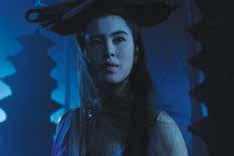
A Chinese Ghost Story III
倩女幽魂 III: 道道道
Hong Kong 1991
Ching Siu-tung
109 min. DCP
In Cantonese with English subtitles New Restoration
“Ching takes [the genre] into the romance of unreason and profane beauty, a surrealist impulse that devours the boundaries of the possible … There’s no telling where Ching’s quest for exquisite incongruities may lead.”
Howard Hampton, Film Comment
Set a century after the first Chinese Ghost Story, this final entry in Tsui Hark and Ching Siu-tung’s series serves as a reboot, swapping Leslie Cheung’s tax collector for Fong, a monk-in-training played by a prestardom Tony Leung Chiu-wai (Chungking Express). The series’s genre balance is also recalibrated here: ancient folk mystery largely cedes the stage to a tone that prefigures the mix of mythic fantasy and screwball sex comedy in Tsui’s Green Snake. Joey Wong returns as a ghost (this time named Lotus); her sister Butterfly (Nina Li Chi) is a kindred spirit as well as a rival. Where the first film’s human-ghost attraction was shadowed by fate, here Fong’s ascetic robes are a flimsy alibi against carnal desire—the romance conjured between him and Butterfly is spectacular, unserious, and forbidden. Lau Shun, as a master martial artist, and Jacky Cheung’s mercenary swordsman provide early-CG assists to the hair-whipping, demon-tongue flicking action.
The Collectors
Begins September 20
Private collections have played a crucial role in shaping the visual arts landscape of Vancouver and Canada, influencing institutional practices through legacy gifts and the individual support of artists and their work.
Collectors are not monolithic—they are delightfully and thankfully idiosyncratic and unique in the work that they collect, and in their histories, attractions, concerns, and tastes. Starting with individual vision and passion, they respond to artists’ capacity to inspire and inform, as well as to the excitement of discovery.
This year, Griffin Art Projects in North Vancouver marks its 10th anniversary through two important exhibitions celebrating the collections and generous collectors who have been part of Griffin’s journey over its first decade as it fulfills its mandate to “examine the dynamics of private collections through exhibitions and public programs.”
In the spring, TENXTEN presented selected acquisitions from ten collections, featuring over seventy artists and providing a comprehensive exploration of collecting practices across Vancouver. This fall, for the second exhibition in the anniversary series, Griffin is delighted to present Christos Dikeakos: The Collectors, a suite of photographs of collectors with their collections. Revealing over a decade of research and visits with artists, patrons, curators, writers, and art lovers alike, these stunning portraits bring the collectors—whose efforts support artists, museums, gallerists, arts ecologies, and ultimately the public—from behind the scenes into the fore.
“The Collectors” film series, presented in collaboration with The Cinematheque, further celebrates, critiques, and reveals the art of collecting through three acclaimed and thought-provoking films: Alexander Sokurov’s Russian Ark, Jill Magid’s The Proposal, and Harold Crooks and Judd Tully’s The Melt Goes On Forever: The Art & Times of David Hammons Dikeakos’s maximalist aesthetic, the question of what it means to hold an archive, and the debates surrounding artistic and cultural practices that query or resist acquisition, all inform this filmic journey.
Lisa Baldissera
Director,
Griffin Art Projects

September 20 (Saturday)
6:30 pm
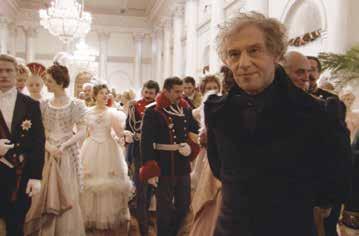
Russian
Ark
Russia/Germany 2002
Alexander Sokurov
95 min. DCP
In Russian with English subtitles
In Person: Christos Dikeakos
“One of the most staggering technical achievements in the history of cinema … Part pageant and museum tour, part theme-park ride and historical meditation.”
Jonathan Rosenbaum, Chicago Reader
A manifest miracle of the cinema, Russian master Alexander Sokurov’s astonishing film offers dreamy passage on the ark of Russian history, in the form of a single, spellbinding, time-travelling tracking shot—the longest uninterrupted Steadicam shot in cinema history—through Saint Petersburg’s famed Hermitage museum. The fantastic voyage begins with the film’s unseen narrator (Sokurov) finding himself inexplicably transported to the museum, where he meets another mystified arrival, the 19th-century French diplomat Marquis de Custine (Sergey Dreiden). Together, the two new companions set out to wander through dozens of grand rooms, miles of corridors, and hundreds of years of history, encountering a parade of historical personages—including still-current Hermitage director Mikhail Piotrovsky— along the way. Over twenty years later, the technical virtuosity of Sokurov’s magnum opus remains breathtaking, as does its feast-for-the-senses tour of one of the world’s preeminent art collections.
Introduced by artist Christos Dikeakos, whose Griffin Art Projects exhibition The Collectors coincides with this film series.
October 18 (Saturday)
6:30 pm

The Proposal
USA 2018
Jill Magid
83 min. DCP
American conceptual artist and writer Jill Magid, whose work featured in Griffin’s TENXTEN exhibition, resumes her ongoing interrogation of power structures in her debut film, described by the artist as “part thriller, part romance.” The final chapter of a project that began in 2013, The Proposal chronicles Magid’s audacious attempt to rescue the archive of Luis Barragán, Mexico’s most famous architect, from the Swiss bunker where a foundation and its unyielding director have kept it hidden from public view for more than two decades. (The archive was bought by a Swiss furniture tycoon as an engagement present for his fiancée—or so the lore goes.)
Magid’s scheme to repatriate the collection, a brazen and scandal-igniting proposition from which the film takes its name, raises existential questions about the nature of artistic legacy when commerce and corporate interest control (or withhold) access to it.
Virtual Q&A with director Jill Magid, moderated by Griffin Art Projects Director Lisa Baldissera.
“[A] captivatingly wily documentary … It shines an ingeniously media-savvy spotlight on Barragán’s work and, not incidentally, on that of the filmmaker herself.”
Jeannette Catsoulis, The New York Times
Cinema Thinks the World
“Cinema Thinks the World” is a project sponsored by the Grant for Catalyzing Research Clusters (GCRC) at the University of British Columbia, and a partnership between UBC and The Cinematheque. Through a series of public screenings, panel talks, and discussions, the project aims to explore the ways in which global cinema represents and helps us to think about the world.

September 23 (Tuesday) Free Admission
7:00pm

Perfumed Nightmare
Mababangong Bangungot
Philippines 1977
Kidlat Tahimik
94 min. DCP
In English, Tagalog, French, and German with English subtitles
“An audacious classic of independent filmmaking.”
Richard Brody, The New Yorker
There is no better film to kick off a new season of “Cinema Thinks the World” than Kidlat Tahimik’s landmark DIY satire of Western cultural and imperial dominance. Tahimik’s signature “cups-ofgas” filmmaking style embraces the resourcefulness required to make a film in his native Philippines: he compares his low-budget practice to an unhurried road trip that scrounges gas along the way, in stark contrast to the fast-paced “full tank” Hollywood method his films openly critique. Perfumed Nightmare follows jeepney driver Kidlat, Tahimik’s onscreen alter ego, on his journey to Paris and corresponding disillusionment with Western culture and technology. Hilarious, disturbing, messy, and brazen, Tahimik’s debut was somewhat ironically celebrated in the Eurodominated film festival circuit and championed by Werner Herzog and Francis Ford Coppola.
Panelists: Chelsea Birks, William Brown, JP Catungal, Christopher Pavsek






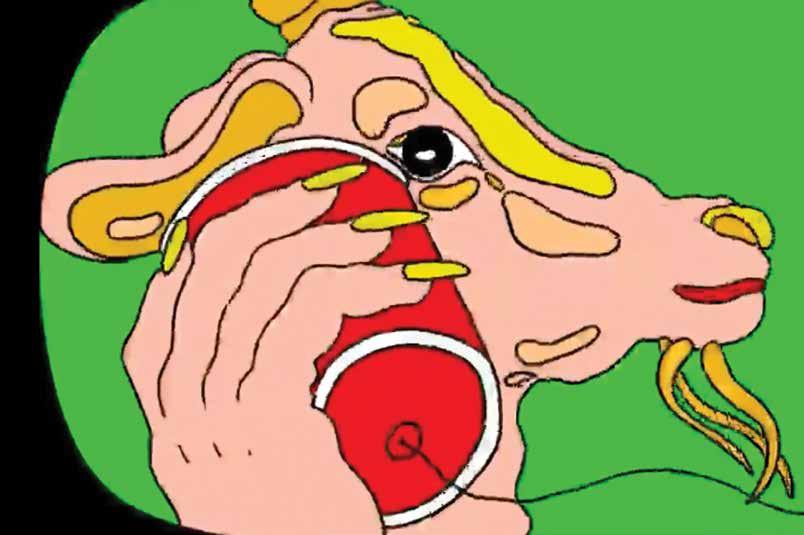
Small File Media Festival 2025 October 17 & 18
Too Small to Fail!
The Small File Media Festival returns to The Cinematheque for its sixth year! Founded in 2020, SFMF raises awareness of the carbon impact of streaming media. The data centres, networks, and devices that store, compress and decompress, transmit, and play video contribute to a whopping 5% of global greenhouse gas emissions—and this number is only rising.
This year, our programming grows out of founder Laura Marks’s Guggenheim Fellowship, “Small Files for a Small World.” Smallfile media thrives in places where electricity and internet access are limited. Marks, and members of our team, trained artists from Mexico City, Tehran, Dhaka, Vancouver, and Cairo in the arts of the small file. The films from these international workshops reflect on place through surprising aesthetics and moving storylines. Frame by frame, they take risks in both politics and art, showing that cinema doesn’t have to be big to be beautiful.
Come experience the Five Beauties of Small Files:
1. Environmentalism! Natch.
2. Creativity! At just 1.44 megabytes per minute, small-file films require creativity at every stage of pre-production, camera and app selection, performance, filming, and compression.
3. Minimal tech! You can make a small-file movie with old devices, encouraging upcycling and saving money.
4. Resilience! Small-file media functions on precarious infrastructures.
5. Discretion! Thanks to video compression, small-file movies protect sensitive information and invite interpretation.
Join us on Friday, October 17 at 7:00 pm for the opening night! We will screen a shorts program of international small files followed by a selection of greatest hits and sleepers from the last five years of the festival. A reception will follow, along with a special announcement! Our festival continues on Saturday, October 18, celebrating over sixty cinematic jewels and the premiere of a feature film by SFMF 2024 Audience Award winners Liam and Will Riley. As always, the festival will stream online at smallfile.ca after the live events.
The 2025 Small File Media Festival continues our partnership with our future-forward friends at VIVO Media Arts, the Cairo Video Festival, The Hmm (Amsterdam), and CONNECT (Ireland). We’re grateful to the Canada Council for the Arts, BC Arts Council, and Social Sciences and Humanities Research Council of Canada.

October 17 (Friday) 7:00 pm
SFMF Series 1
The Blue Room: Waves of Veiled Revelations Program runtime: 58 min.
Conceived by two curators for screening on two consecutive days, the festival’s companion programs (“The Blue Room” on Friday night and “The Red Room” on Saturday morning) distill material from small-file film workshops held in Bangladesh, Canada, Egypt, Mexico, and Iran. Whether a mystery roe or a punk claw, the inhabitants of these two different worlds coexist and speak to each other in non-obvious ways, like entangled quantum computations.
Wandering through tangled pixels, urban echoes, and velvety oneiric visions, “The Blue Room” opens a subliminal snowfield of opaque layers, spawning transmutation cycles and waves over waves of veiled messages. Silent, subtle and calm, this program eavesdrops on a conversation of ghost creeks, oscillating drones, and fast-disappearing gleams.
—Mena El Shazly & Radek Przedpełski
A Creek at Spanish Banks
Canada 2024 | Thomas Evdokimoff | 4 min. 5.97 MB
Knock Knock Iran 2025 | Avin Hamasian | 2 min. 3.2 MB
Bougainvillea Iran 2025 | Neda Sangtarash | 3 min. 4.29 MB
Macbeth and the Three Weird Sisters: A Parody Canada 2024 | Helen Jiang | 2 min. 3.04 MB
Wild and Free
Bangladesh 2024 | Sumaiya Shams Joyeeta 4 min. 4.88 MB
Existence
Iran 2025 | Shima Omidvar | 1 min. 1.41 MB
Gleams in Fractures
Iran 2025 | Farzin Azarm | 5 min. 8.75 MB
Lost Playgrounds
Bangladesh 2024 | Fariha Shahin | 4 min. 5.54 MB
WHAT DID YOU EAT TODAY
Mexico 2024 | Hugo Hernandez | 2 min. 3.55 MB
untitled
Mexico 2024 | Denise Serrano | 5 min. 6.27 MB
Transmutation
Mexico 2024 | Atzel Colin | 2 min. 1.76 MB
Lost in the Machine
Egypt 2024 | Amira El Badry | 1 min. 2.41 MB
Snake and Stairs
Iran 2025 | Haniyeh Mortezazade | 4 min. 6.97 MB
Retina
Egypt 2024 | Yahya Muhammad | 2 min. 3.68 MB
What We Have Left
Mexico 2024 | Mónica Luna | 3 min. 2.08 MB
TELL IF TIME IS PASSING
Iran 2025 | Marjan Pirata | 2 min. 2.17 MB
Wondering Wandering
Bangladesh 2024 | Mahamudul Hasan Akhand 2 min. 2.29 MB
Live Screen
Egypt 2024 | Helena Abdelnasser | 3 min. 4.4 MB
VISIONS
Canada 2024 | Noah Roberts | 1 min. 0.63 MB
Snow
Egypt 2024 | Amal Shafek | 2 min. 1.79 MB
The Veil of Corrosion
Bangladesh 2024 | Md. Tahjid Ahsan | 3 min. 4.2 MB
—intermission—
Sleep Spells
Program runtime: 54 min.
You enter a tiny forest, one of the last green refuges in an attempt to escape the 4K media dystopia. The din of modernity fades as you walk deeper into the trees, guided by tiny flickering lights. You come upon a clearing and a mage steps forth, placing you under a powerful spell. A reverie takes hold, the world becomes smaller, the lights become visions, and you are transported to the great world of small.
Prepare to be enchanted with “Sleep Spells,” a collection of hits and sleepers from the last five years of the festival. A cavalcade of crystalline gems encompassing all that is small: have you been sleeping on small files?
—Yani Kong & Joey Malbon
Once Upon a Time
Canada 2020 | Hân Phạm | 5 min. 5.67 MB
Mohthth
USA 2020 | Weihan Zhou | 3 min. 3.9 MB
Catfessions #1
Canada 2020 | Pierre Leichner | 3 min. 4.5 MB
Catfessions #2
Canada 2020 | Pierre Leichner | 1 min. 5 MB
Glints 1–4
Iran/Canada 2021 | Somayah Khakshoor | 7 min. 13.8 MB
Doomer 1–3
Canada 2022 | Amber Morrison, Scott Fox | 2 min. 6.3 MB
Yan
USA 2023 | Vesper Gau | 12 min. 19.7 MB
crapper
Canada 2024 | Pablo Garcia Garcia | 7 min. 6.7 MB
I do not have enough money to buy new underwear
Canada 2024 | Jayson Sloan | 2 min. 0.7 MB
A Story of Snow
Canada 2024 | Liam Riley, Will Riley | 9 min. 9.7 MB
N’oublie pas la Crème / Don’t Forget the Cream
Canada 2024 | Monique Motut-Firth | 3 min. 3.1 MB
October 18 (Saturday) 11:00 am
SFMF Series 2
The Red Room: Particles of Love and Resistance
Program runtime: 58 min.
The companion to Friday’s “Blue Room” program, “The Red Room” distills material from small-file film workshops held in Bangladesh, Canada, Egypt, Mexico, and Iran. Diving head-first into quantum dislocations and confronting us with critical visions of cities fractured by power, “The Red Room” is punctuated by particle eruptions, transmitting tectonic shifts and haunted reveries. Critical, abrasive, and outspoken, this program incites, spins, and shouts, spewing quantum chaos and puncturing clichés.
—Mena El Shazly & Radek Przedpełski
This Film Must Be Approved
Canada 2024 | James Sun | 11 min. 14 MB
Out for a Walk with Waste
Mexico 2024 | Efraín Cervantes | 2 min. 2.51 MB
Apokatastasis
Mexico 2024 | David de la Rosa | 2 min. 2.35 MB
Since the Age of Nine the World is Rotten with Sanity Mexico 2024 | El Milagro | 5 min. 9.91 MB
Red Balloon
Iran 2025 | Hossein Qamooshi | 3 min. 3.29 MB
Dream
Iran 2025 | Masoumeh Khodabakhshi | 2 min. 1.55 MB
Dualities of a City
Egypt 2024 | Noura A. Rahman | 2 min. 0.92 MB
temporarily closed
Mexico 2024 | Paulina López | 5 min. 6.33 MB
Hole Dreams
Iran 2025 | Arya Mehr | 2 min. 3.07 MB
Echo of Imagination
Egypt 2024 | Nada Qasem | 1 min. 1.96 MB
A Poem
Iran 2025 | Tina Taghavi | 2 min. 2.97 MB
Syzyf
Egypt 2024 | Ibrahim Rabie | 3 min. 4.7 MB
witch
Mexico 2024 | Catalina Pérez | 1 min. 1.66 MB
Four Fundamental Concepts
Egypt 2024 | George Bartlett | 5 min. 7.51 MB
The Ahuehuete Trees of Chapultepec Forest Mexico 2024 | Diandra Arriaga | 4 min. 5.6 MB
Looking for Cairo
Egypt 2024 | Rasia Yusuf | 5 min. 7.16 MB
Fragmentation /ˌfræɡ.menˈ teɪ .ʃən/
Iran 2025 | Elahe Shamlou | 3 min. 4.75 MB
—intermission—
Compagnons du devoir
Program runtime: 30 min.
Featuring a cohort of those nearest and dearest to the small-file spirit, this special program invites cherished allies and alumni to elevate ecomedia with ingenuity and purpose, screening experiments and original works that resonate far beyond their digital footprint. Keep an eye on smallfile.ca and @smallfile as we tease the lineup this fall.
—Joni Schinkel
October 18 (Saturday) 2:00 pm
SFMF Series 3
On Running and Hiding
Canada 2025 | Liam Riley, Will Riley | 65 min. 93 MB
After meeting by happenstance, two troubled gig-working microinfluencers struggle to make it in Vancouver. Join us for the world premiere of this commissioned feature-length small-file film by directors Liam and Will Riley, 2024 SFMF Audience Award Winners. Talkback to follow with filmmakers in attendance.
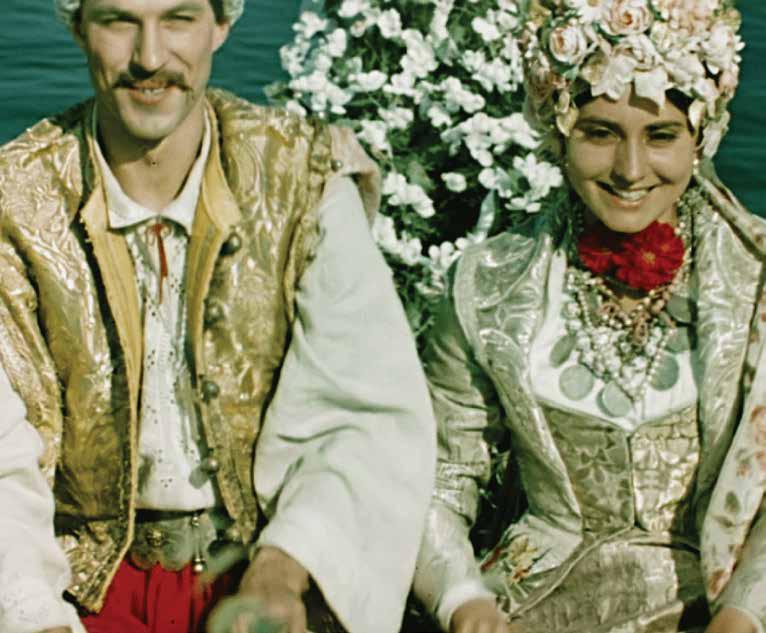
Ukrainian Poetic Cinema: Rebuilding National Identity October 23–29
Following the death of Joseph Stalin in 1953, there was a temporary thaw in cultural policy across much of the Soviet sphere of influence in Europe. For the first time since 1934, when the official cultural doctrine of “socialist realism” was adopted, filmmakers were allowed to produce content tailored for regional audiences. In Ukraine, this led to the creation of works in a style dubbed by film critic Janusz Gazda as “Ukrainian poetic cinema.” In revolt against the linear, formulaic storytelling mandated for decades by the State, contributors to this movement developed an expressive cinematic language of their own, one distinctly Ukrainian in content and form. The movement was short-lived, flourishing in the 1960s and 1970s, with some important examples outside that period.
Ukrainian poetic cinema explores themes and stories from Ukrainian literature and folk cultures, especially from the western regions of Ukraine that were less affected by the Holodomor and less stifled by cultural erasure through Russification. Internationally, the most well-known of these films is Sergei Parajanov’s Shadows of Forgotten Ancestors (1965). Other films from this movement were never allowed to enter international competitions by the Soviet regime; many did not reach audiences at all until the early 1990s. This series offers the chance to see two of the brightest examples of Ukrainian poetic cinema, in signature films by Yurii Illienko and Borys Ivchenko.
In the 1960s, producers at Dovzhenko Film Studio wanted to adapt every story in Mykola Hohol’s first collection, Evenings Near the Village of Dikanka (1832). Although considered a great avatar of Russian literature (and better known in the English-speaking world under the Russian name Nikolai Gogol), Hohol was in fact born and raised in Ukraine, where these stories are set. Only two of the project’s films were ever completed: Illienko’s The Eve of Ivan Kupalo (1968) and Ivchenko’s The Lost Letter (1972). Both films draw deeply from Ukrainian folk traditions and from the painful history of Ukraine. Soviet authorities objected to the expressions of Ukrainian identity and banned them immediately upon release.
Alina
Senchenko
Series curator
Co-presented with Maple Hope Foundation


“The main narrative model of this movement was the mythologized parable, which made it possible to convey the often complex and deep concept of the film in a laconic and figurative manner.”
Elena Rubashevska, Ukrainian Poetic Cinema
October 23 (Thursday) 6:30 pm
October 29 (Wednesday) 8:50 pm
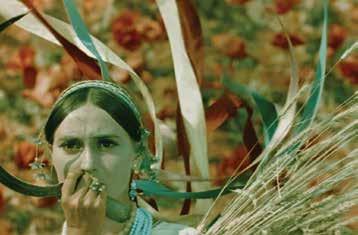
The Eve of Ivan Kupalo
USSR 1968
Yurii Illienko
71 min. DCP
In Ukrainian with English subtitles
Yurii Illienko was the most prominent contributor to Ukrainian poetic cinema. As a cinematographer, he was internationally recognized for his work on Sergei Parajanov’s Shadows of Forgotten Ancestors (1965). Little seen outside of Ukraine even today, The Eve of Ivan Kupalo (1965), shot on 70mm, is the second film directed by Illienko. A loose adaptation of Mykola Hohol’s story of the same name, the film is like a lucid dream, a visual poem full of rhythmic repetitions, startling montage, fluid camera movement, and solarization. At the heart of the story is a forbidden love. A father prevents a poor farmhand, Petro, from marrying his daughter, Pydorka. Satan intervenes, offering Petro a deal in exchange for the gold he needs to open the way to marriage. Through an amalgam of mystical folk motifs, Cossack songs, and satirical representations of village life, Illienko gives viewers a unique glimpse into Ukrainian history and a surreal critique of Ukraine’s colonial domination by Russia.
The screening on October 23 will be preceded by a 6:00 pm reception and video introduction by curator Alina Senchenko.
“A visually astonishing work on the borderline between cinematic narrative and pure poetry … One of Illienko’s richest films.”
Film at Lincoln Center
October 23 (Thursday) 8:20 pm
October 25 (Saturday) 6:30 pm
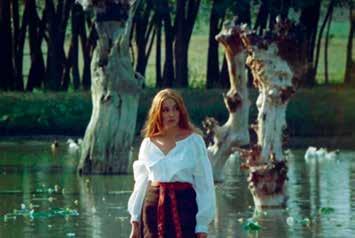
The Lost Letter
Пропала грамота
USSR 1972
Borys Ivchenko
79 min. DCP
In Ukrainian with English subtitles
“Had The Lost Letter received adequate international exposure at the time, it would have been known today as one of the finest examples of East European cinematic magical realism, alongside films made in the same period by Zoltán Huszárik in Hungary or Wojciech Has in Poland.”
Ana Hedberg Olenina & Dina Iordanova, Slavic and East European Journal
Borys Ivchenko’s adaptation of the Mykola Hohol story is a comedic blend of road movie and adventure film, drawing deeply on Cossack legend, superstition, and folk mysticism. The protagonist, Vasyl, is assigned to deliver an important letter from the Hetman to the Russian Empress in Saint Petersburg. During his journey, he is joined by a fellow Cossack, and together they face many challenges and temptations. Ivchenko’s humorous film shows the disparities between the centre of the Russian empire and its colonies, while highlighting Ukraine’s pursuit of legal autonomy and cultural independence. Banned upon completion, The Lost Letter went unseen by audiences for almost eleven years.
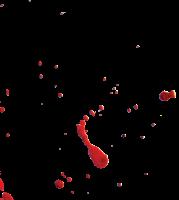
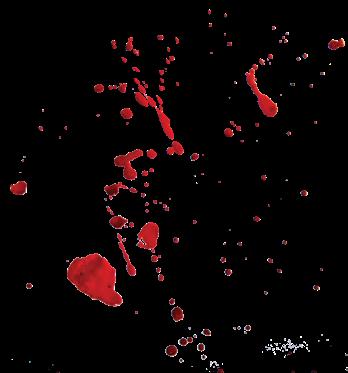
13-Hour Horror Movie Marathon
“Horror is a universal language; we’re all afraid.”
John Carpenter
Friday, October 31 –Saturday, November 1 8 pm–9 am
Think you’ve got the spine to spend Halloween night at The Cinematheque?
For 13 unholy hours, we’ll ply your senses (and fray your nerves) with a non-stop stream of scary movies, a curated grab bag of arthouse horror we think aficionadas and neophytes alike will simply die for! That’s the treat. The trick—our lineup is strictly under lock and key, meaning marathoners will need to submit, blindly, to whatever salvo of screen terror our staff has in store. Diabolical, no? Midnight snacks and bottomless sleep-repelling caffeine included. BYO blankets and pillows.
It’ll be a bloody good time, trust us. (Cue maniacal laughter.)
Special ticket price: $50
Limited early-bird ticket price (until October 1): $40
No passes or Ticket Pack vouchers will be accepted for this event.
Ongoing
Series
PELAN Presents
A bimonthly series organized in partnership with PELAN, a nonprofit and nonpartisan media organization spotlighting independent documentaries by Iranian and non-Iranian directors about Iranian people.
October 16 (Thursday) 7:00 pm
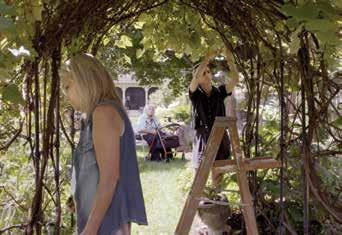
Joonam
منوج
USA 2023
Sierra Urich
100 min. DCP
In English, Farsi, and Azeri with English subtitles
A Sundance 2023 official selection, Joonam is a heartfelt and intimate documentary on identity, intergenerational trauma, and the search for belonging that resonates across diasporas. Sierra Urich, a filmmaker raised in Vermont by her Iranian mother and American father, seeks to explore the complexities of identity, memory, and generational ties. She invites her mother Mitra and her grandmother Behjat to join her on a deeply personal journey to uncover her family’s past and understand the experiences that shaped these women in her life. Together, they revisit stories of migration, loss, and resilience, navigating the intricate mother-daughter dynamics that span several decades. As Behjat, speaking in broken English, attempts to connect to her granddaughter, the filmmaker tries to bridge the distance between past and present, and portray their shared effort to make sense of the fragmented path to their adopted American homeland.
Post-screening audience discussion moderated by PELAN.
“A heartfelt exploration of those living within a diaspora, the fractured connection each generation has to their own culture, and the irrevocable bond of shared roots.”
Marya E. Gates, RogerEbert.com
Ongoing Series Frames of Mind
A mental health film series.
The Cinematheque is pleased to join with the Institute of Mental Health, UBC Department of Psychiatry, in presenting Frames of Mind, a monthly event utilizing film to promote professional and community education on issues pertaining to mental health and illness.
Series directed by Dr. Harry Karlinsky, clinical professor, Department of Psychiatry, University of British Columbia. Panel discussions moderated by Dr. Harry Karlinsky.
Programmed by Selina Crammond, film curator and cultural worker.
Programmer emeritus: Caroline Coutts, film curator, filmmaker, and programmer of Frames of Mind from its inception in September 2002 to September 2023.
September 17 (Wednesday) 7:00 pm
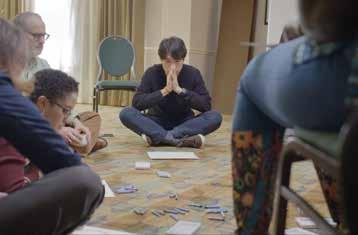
Climate in Therapy
Sweden/Norway 2025
Nathan Grossman
65 min. DCP
In English
Vancouver Premiere
In his influential 1949 book A Sand County Almanac, conservationist Aldo Leopold first articulated the concept of ecological grief, writing, “One of the penalties of an ecological education is that one lives alone in a world of wounds.” Rejecting such a fate, in Nathan Grossman’s Climate in Therapy seven climate scientists sign up for a group therapy session facilitated by therapist Richard Beck. With humour and astute observation, Beck employs Socratic questioning to unearth complicated feelings as the group discloses their emotional selves. “When we try to fight or defend science, we suffer,” says one biologist, enunciating a voice of reason in a divided world where science is seen as conspiracy. Record-breaking temperatures and extreme weather events make clear that global warming is no longer an abstract idea. In order to cope with increased existential anxiety and fear, Beck’s therapy session makes clear that human connection is necessary—for climatologists and everyday citizens alike.
Post-screening discussion with Dr. Rashmi Chadha and Dr. Kai Irani.
Co-sponsored by Doctors for Planetary Health–West Coast and the Canadian Association of Physicians for the Environment


October 22 (Wednesday) 7:00 pm

Fremont
USA 2023
Babak Jalali
91 min. DCP
In English, Dari, and Cantonese with English subtitles
Fremont, California, known for having the largest Afghan diaspora in the US, is home to Donya (Anaita Wali Zada), a young woman and former translator for the U.S. Army. Every morning she commutes to San Francisco’s Chinatown where she works at a fortune cookie factory. Despite friendly coworkers and an unusually supportive boss, her discontent is palpable. While seeing an earnest psychiatrist (Gregg Turkington) for insomnia, whose “bibliotherapy” approach wavers in helping Donya make sense of her trauma, she sets off on a road trip that results in an awkward yet sweet encounter with a mechanic (Jeremy Allen White). The film’s saturnine atmosphere, intensified by stoic black-and-white cinematography, is softened by deadpan humour, earning comparisons to Jim Jarmusch, Aki Kaurismäki, and Paweł Pawlikowski. Challenging American dream platitudes, Fremont presents an unsensational depiction of PTSD and survivor’s guilt that is complicated by longing for companionship and a less monotonous life.
Welcoming remarks by Dr. Lakshmi N. Yatham and Dr. Catherine Hickey.
Post-screening discussion with Dr. Martina Scholtens, a psychiatrist based in Victoria, BC, and author of Your Heart Is the Size of Your Fist

Co-sponsored by the Canadian Psychiatric Association
Ongoing Series
DIM Cinema
Moving-image art in dialogue with cinema.
Curated by the DIM Collective
DIM Cinema is a monthly series that presents Canadian and international movingimage art in dialogue with cinema. The series was initiated in 2008 by local curator Amy Kazymerchyk to draw attention to artists and experimental filmmakers whose practices engage with cinema as a medium, social context, formal structure, or architectural space. The name of the series is inspired by the diffused Vancouver sky, the darkness of the cinema, and a quote from James Broughton’s Making Light of It (1992): “Movie images are dim reflections of the beauty and ferocity in mankind.” From 2014 to 2024, DIM Cinema was curated by the late Michèle Smith.
The DIM Collective is Tobin Gibson, the Iris Film Collective, Steff Huì Cí Ling, and Casey Wei.
September 29 (Monday) 7:00 pm

88:88
Canada 2015
Isiah Medina
65 min. DCP
In Person: Isiah Medina
“I could say that 88:88 is a masterpiece but masterpieces are a term of the past; Medina has taken his first step into the future.” Phil Coldiron, Cinema Scope
When one is unable to pay the bills, the electricity is cut. Once one can pay again, the digital appliances flash 88:88. While philosophical systems begin with the concept of nothing as a starting point for thinking, Isiah Medina’s feature debut uses “88:88” as a marker of the nothing (no thing) of poverty and the possibility of counting life anew. Medina’s film cuts together instances in the lives of friends and their experiences in love, science, art, and politics in order to see those lives outside of narrative, and to show that thinking is always both possible and necessary. Praised by philosophers, filmmakers, artists, mathematicians, and audiences around the world, 88:88 celebrates its 10th anniversary this year.
Programmed by Steff Huì Cí Ling. Post-screening discussion between the filmmaker and philosopher Alberto Toscano.
October 20 (Monday) 7:00 pm

World as Tripod
In partnership with Centre A’s group exhibition featuring new work by Jaewoo Kang, Lauraine Mak, and Casey Wei, this omnibus screening takes that exhibition’s title, World as Tripod, as its thematic prompt. Contributing artists are invited by Kang, Mak, and Wei as collaborators, peers, and friends whose works and lives have long stood in relation to each other. Working in experimental film and video, new and recent works by Elvo Axt, Barry Doupé and Dennis Ha, Russell Gordon, Reed Jackson, Clark Nikolai, and Chris Zhongtian Yuan respond to the whole wide world as the armature upon which to create. While technology has always played its part in human progress and cultural evolution, it is the role of art to consider technological development in relation to the poetics of intuition, play, and critique. —Casey Wei
Curated by Jaewoo Kang, Lauraine Mak, and Casey Wei.
As some works are still in production, a complete list of films included in this program will be published online at thecinematheque.ca/dim
Ongoing Series
Our Stories to Tell
Indigenous storytelling.
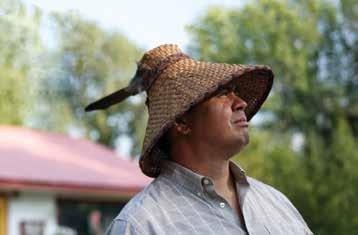
Tea Creek
Canada 2024
Ryan Dickie
74 min. DCP
Tsimshian man Jacob Beaton left the corporate world in 2020 to confront the threat of the climate crisis by transforming his family farm into Tea Creek, an Indigenous food sovereignty training centre. Dene filmmaker Ryan Dickie follows Jacob and his team across their third year of training, capturing the ups and downs of farm life, the healing of ongoing and historical wounds of colonization, and the uplifting of community through the growing, harvesting, and sharing of food. The history of Tea Creek is weaved together with intimate portrayals of Jacob, his team members, and trainee Justice Moore, who shares how the farm helped him confront intergenerational trauma by reconnecting him with the land. Every subject’s story in the film proves why Tea Creek has been named a United Nations Food Hero.
“Explores the rich history of Indigenous agriculture while not shying away from the ongoing impacts of colonization. This is an intimate portrayal of a passionate leader, whose vision for change is creating space for Indigenous-led healing and abundance.”
DOXA 2024
Our Stories to Tell is a monthly series dedicated to showcasing the new wave of inspired Indigenous storytelling in film, as well as spotlighting up-and-coming Indigenous artists across Turtle Island and beyond. Programmed and hosted by Akira Iahtail, film curator and filmmaker of Cree and Swampy Cree descent.
Series advisor: Lyana Patrick, filmmaker, assistant professor in the Faculty of Health Sciences at Simon Fraser University, and member of the Stellat’en First Nation.



Stories to Share: Respecting the Spirit
Program runtime: 78 min.
Stories have the power to teach us how to love and protect each other and all living things; if their lessons go unheeded, consequences may follow. Anishinaabe director Cole Forrest’s Ozigwan (Tail of Serpent) tells the story of a grandmother and grandson on a fishing trip as they uncover the gate to the serpent people. Cree-Métis filmmaker Asia Youngman chronicles an adopted Indigenous teenager’s desire for belonging in N’xaxaitkw, a word meaning the sacred spirit of the syilxʷ people. Northlore, co-directed by Melaina Sheldon of the Inland Tlingít, draws connections between the people and wildlife of Canada’s North through animation and live action. “Stories to Share: Respecting the Spirit” highlights the importance of honouring stories of where we come from.
Ozigwan (Tail of Serpent)
Canada 2023
Cole Forrest 7 min. DCP
N’xaxaitkw
Canada 2022
Asia Youngman 17 min. DCP
Northlore
Canada 2025
David Hamelin, Melaina Sheldon 54 min. DCP
Ongoing Series
Film Club

Film Club is a family-friendly movie matinee series held at The Cinematheque on the third Sunday of each month. By way of carefully selected all-ages titles, balancing classics and new favourites, our programming team extends a welcome to the next generation of cinemagoers—and anyone who wants to revisit a treasured film.
Free popcorn and Film Club badge for junior cinephiles (ages 13 and under), and free coffee and tea for adults!
Special discounted ticket price for parent/guardian and child under 13 ($18). Additional child tickets available at $7.
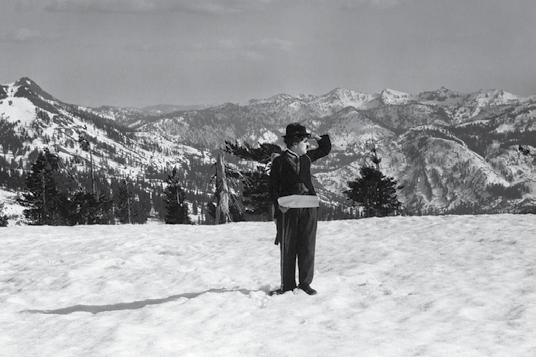
The Gold Rush
USA 1925
Charles Chaplin
88 min. DCP
Charlie Chaplin called The Gold Rush “the picture I want to be remembered by.” It is perhaps the masterpiece with more memorable, perfectly structured comic sequences than in any of his other films. The plot is a familiar—but majestically positioned—problem for the Tramp, who treks to the Klondike of 1898 in search of fortune, only to wind up snowbound in a hilariously unbalanced cabin, preyed upon by bears and ferocious fellow prospectors, and attacked by his own appetite. His hunger, for riches, shoelaces, and a cure to his New Year’s Eve loneliness, was a huge global hit with audiences upon its release, and, contrary to Chaplin’s desire to update the film in the sound era, still feels like the most vital ingredients for a cinematic laugh and cry, one hundred years later. This restoration of the original silent version, which premiered to thousands at Il Cinema Ritrovato this summer, is the result of a wide search for improving on the materials used for the 2012 re-release.
“An old favourite!”
Michael Snow (Wavelength), Sight and Sound ’s Greatest Films of All Time
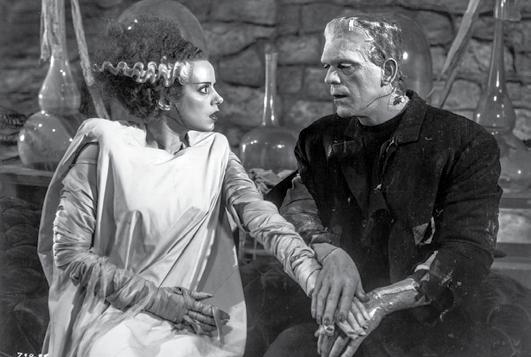
Bride of Frankenstein
USA 1935
James Whale 75 min. DCP
“It’s satirical, exciting, funny, and an influential masterpiece of art direction.”
Roger Ebert, Chicago Sun-Times
While its title promises a marriage, Bride of Frankenstein opens with a rather serious problem: both Dr. Frankenstein (Colin Clive) and the Monster he created (Boris Karloff) are by all accounts dead. Not for long! Director James Whale, given complete freedom after the success of the first Frankenstein (and from the fact that Mary Shelley never wrote a sequel) focuses on the core questions posed by Frankenstein’s creation, rather than plot. Does the Monster, who begins the film without any knowledge of spoken language, most resemble an animal, a violent criminal, or a child in need of attention and care? And do the scientists who want to look at him so closely (or kill him) have any real motivating purpose beyond amusement at a plaything? Lord Byron, “England’s greatest sinner,” prompts the premise in an opening cameo; Karloff’s performance, an influence on everything from the Iron Giant to Dougie in Twin Peaks, can be appreciated as both comical camp and pure pathos.

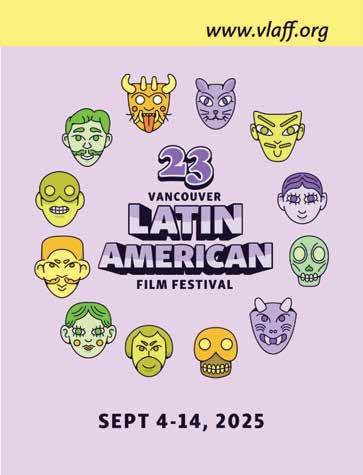


Howe Street, Vancouver
